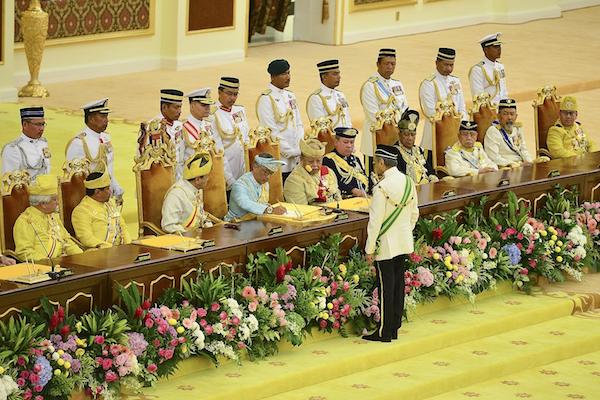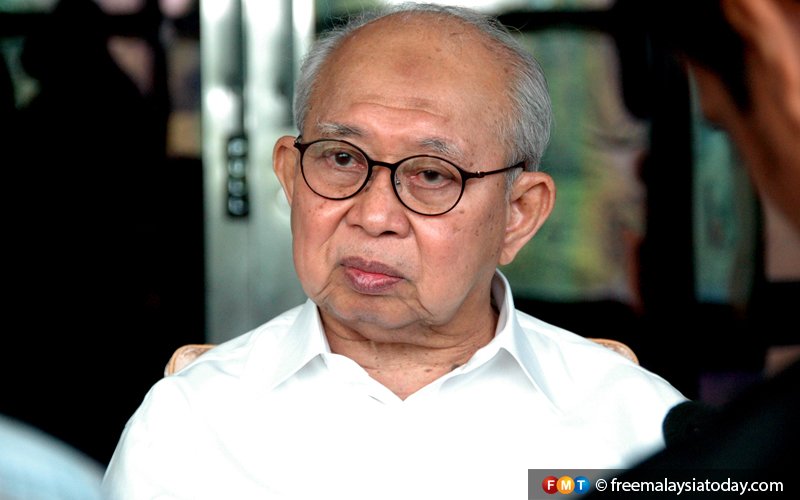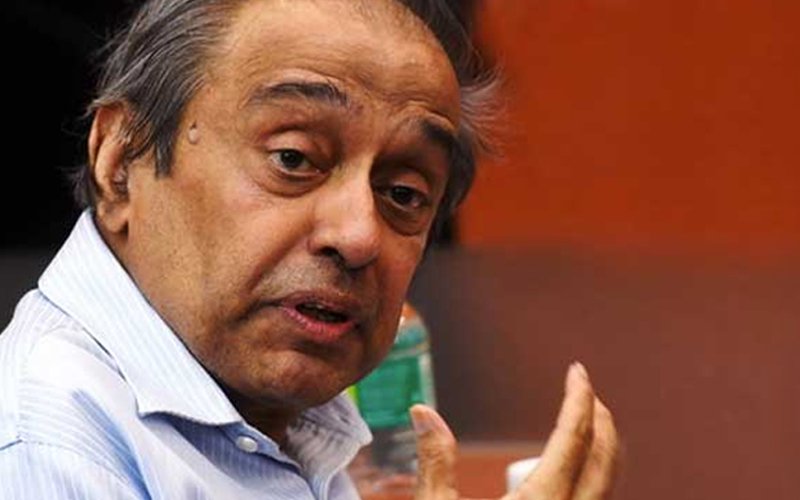Code of ethics signed by Malay rulers 30 years ago draws the line on politics, business and media

(Malaysia Now) – A landmark proclamation in 1992 by six Malay rulers – five of whom were the fathers of present rulers – had set some ground rules on the conduct of sultans in discharging their constitutional duties, in a document that was drafted with the help of senior Umno leaders at the time, including Anwar Ibrahim.
The Proclamation of Constitutional Principles received the consent of six Malay rulers including then-Yang di-Pertuan Agong Sultan Azlan Shah in July 1992, following a protracted debate on the involvement of the royalty in business as well as perceived interference in politics.
The signing of the proclamation, which was available officially in both Malay and English, was attended by the rulers of Perak, Negeri Sembilan, Perlis and Pahang, as well as then-prime minister Dr Mahathir Mohamad and top Umno leaders of that time including then-party vice-president Anwar Ibrahim, among the Umno leaders responsible for drafting the document.

Anwar Ibrahim was involved in the 1992 Constitutional Crisis
Anwar at the time welcomed the proclamation as a step forward in strengthening the system of constitutional monarchy.
“Umno and the government’s stand on the position of the Malay rulers and principles of constitutional monarchy have been clarified in the proclamation,” Anwar, currently the PKR president, had said.
Veteran social critic Chandra Muzaffar said it was important to reiterate the contents of the proclamation.
“If after 29 years it has become necessary to reiterate this fundamental principle, it is because some individuals are trying to manipulate the rulers to extricate themselves from issues of right and wrong and to further their own nefarious agendas,” Chandra, who left PKR’s precursor Parti Keadilan Nasional three years after he helped found the party in 1999, told MalaysiaNow.
“The rulers and the people should not allow this to happen for what is at stake is the integrity and viability of the Malaysian nation,” he said.
Strained ties with palace
The proclamation was signed after two years of strained ties between Umno and the palace, following claims of palace interference in Kelantan, as well financial allocations and business projects involving the Selangor palace.

Ku Li used the Kelantan Palace in 1990 to oust Umno in Kelantan, which triggered the Constitutional Crisis
In 1990, the election year in which Umno lost Kelantan to an alliance of PAS and Semangat 46 – the party led by Kelantan royalty Tengku Razaleigh Hamzah – the Umno general assembly heard delegates questioning what they said was the involvement of the Kelantan sultan in party politics.
They were also unhappy with the action of some rulers to vent their displeasure with the government in the media.
“It is clear that in this matter, the rulers in their actions and comments to the media had interfered in matters of state administration which are actually within the jurisdiction of the menteri besar and state executive council members,” members of the Umno Supreme Council wrote in a letter to the Agong in February 1992.
The letter was the result of a series of statements and memorandums from Umno which were critical of the rulers over various incidents involving the royal families of Selangor, Kelantan and Johor.
Some five months after the letter to the Agong, the Proclamation of Constitutional Principles was signed by six Malay rulers, including Sultan Azlan Shah, the Agong at that time.
However, the sultans of Kelantan, Johor and Kedah did not sign the document.

Reminder on powers
For Chandra (picture above), the 1992 document is a good reminder for rulers, the Cabinet and the people as a whole.
“It reaffirms the fundamental guidelines that shape the institution of constitutional monarchy, which is one of the cornerstones in the entire system of governance in Malaysia,” he told MalaysiaNow.
“It is crystal clear from their own proclamation that the Agong acts on the advice of the Cabinet at the federal level just as the rulers act on the advice of the state executive councils at the state level. This is in accordance with the Malaysian constitution.”
Key points of proclamation
The proclamation served as a code of conduct for the royal institution, stating their rights and responsibilities as well as the areas in which they had no say or must abide by the advice of the government of the day.
Among others, it specified how sultans were to conduct themselves in matters involving politics and the appointment of the menteri besar, state executive council members and senior government officers, as well as in getting advice from the executive.
“We shall in accordance with the general principle provided in each State Constitution, act on the advice of the State Executive Council or of the Menteri Besar,” the proclamation stated.
On politics, the proclamation made it clear that “we are not directly or indirectly involved in party politics”.
The document also touched on how the rulers would conduct themselves with regards to business activities, expenses of the royal households, religion and the media.
The rulers said they had the right to be consulted and briefed by the menteri besar on the state’s administration as well as to “encourage” and “caution” the government.
But they also pledged not to take their case to the media.
“We, in accordance with constitutional practice, do not disclose to or discuss with the media any matter pertaining to the administration of the State which is likely to give rise to controversy,” the document said.
The rulers similarly pledged to stay out of any business activities except through trustees and nominees.
**************************************************************************
Proclamation of Constitutional Principles
Proclamation dated July 4, 1992, and made by us:
DYMM SPB Yang di Pertuan Agong IX Sultan Azlan Shah ibni Almarhum Sultan Yussuf Izzuddin Ghafarullahu-Lahu Shah; DYMM Tuanku Syed Putra ibni Almarhum Syed Hassan Jamalullail, Raja Perlis Indera Kayangan; DYMM Sultan Salahuddin Abdul Aziz Shah Alhaj ibni Almarhum Sultan Hisamuddin Alam Shah Alhaj, Sultan Selangor Darul Ehsan; DYMM Tuanku Ja’afar ibni Almarhum Tuanku Abdul Rahman, Yang diPertuan Besar Negri Sembilan Darul Khusus; DYMM Sultan Haji Ahmad Shah Al-Musta’in Billah ibni Almarhum Sultan Abu Bakar Ri’ayatuddin Al-Mu’adzam Shah, Sultan Pahang Darul Makmur; DYMM Sultan Mahmud Al-Muktafi Billah Shah ibni Almarhum Tuanku Al Sultan Ismail Nasiruddin Shah, Sultan Terengganu Darul Iman; and KDYMM Raja Nazrin Shah ibni Sultan Azlan Muhibbuddin Shah, Pemangku Raja Perak Darul Ridzuan.
Whereas by Article 71 of the Federal Constitution it is provided inter alia that the Federation shall guarantee the right of a Ruler of a State to succeed and to hold, enjoy and exercise the constitutional rights and privileges of Rulers of that State in accordance with the Constitution of that State;
And whereas by Article 181 of the Federal Constitution the sovereignty, prerogatives, powers and jurisdiction of the Rulers within their respective territories as hitherto had and enjoyed shall, subject to the provisions of the said Constitution, remain unaffected;
And whereas we are desirous that at all times the Constitution and the laws of Malaysia are upheld in the nation by all persons;
And whereas we subscribe to the principles of the rule of law;
And whereas to avoid any misinterpretation as to the nature and extent of their sovereignty, prerogatives, powers and jurisdiction;
Now, therefore, we hereby make the following proclamation on the nature and extent of such prerogatives and powers:
1. Involvement in politics
1.1. In accordance with established practice and convention, we are not directly or indirectly involved in party politics.
2. Appointment of Menteri Besar
2.1. In accordance with the State Constitution, we shall accept the nomination of a person who commands the confidence of the majority of the members of the Legislative Assembly as the Menteri Besar.
2.2. Where no party has a clear majority in the Legislative Assembly, we shall exercise our own discretion in such appointment in accordance with accepted constitutional principles.
2.3. When we have any reservation as to the suitability of any person nominated as Menteri Besar, we may refer the nomination for reconsideration by the leader of the appropriate party for a final decision.
3. Appointment of State Executive Council Members
3.1. We accept that the appointment of members of the State Executive Council is made on the advice of the Menteri Besar alone and that in accordance with the State Constitution, we shall approve such appointments.
4. Acting on advice
4.1. We shall, in accordance with the general principle provided in each State Constitution, act on the advice of the State Executive Council or of the Menteri Besar.
4.2. We recognise that in accordance with established constitutional practice, the terms “acting on advice” or “Ruler in Council” and other similar terms mean that we shall accept the advice of the Government of the State as tendered by the Menteri Besar and the State Executive Council.
4.3. In accordance with established constitutional practice, we shall have the right to be consulted, the right to encourage and the right to caution the Government.
4.4. In furtherance of our right to request any information concerning the Government of the State as provided for in each State Constitution, we shall have the right to be briefed by the Menteri Besar as and when requested by us and also prior to each meeting of the State Executive Council.
5. Appointment of senior government officers
5.1. We shall appoint the State Secretary, the State Legal Adviser and the State Financial Officer on the recommendation of the appropriate Public Service Commission, and also in accordance with the practice and the provisions of the State Constitution, after the name of the candidate has been submitted to us by the Menteri Besar.
5.2. In accordance with the present practice, we shall be consulted before appointments are made of all heads of Federal Departments in the State.
5.3. We shall appoint the members of the State Public Service Commission in accordance with the relevant State legislation.
6. Business
6.1. We shall not actively engage in any commercial enterprise except by way of trust.
6.2. His Royal Highness the Regent may through trustees/nominees participate in any commercial enterprise.
7. Expenses of the Royal Household
7.1. The Comptroller of the Royal Household shall control and administer the allocations provided for in the Civil List, in accordance with the financial procedure.
8. Religion
8.1. In accordance with the constitutional principle that we are the heads of the religion of Islam in our respective States, we reaffirm our position that we will uphold the teachings and practice of Islam.
9. The media
9.1. We, in accordance with constitutional practice, do not disclose to or discuss with the media any matter pertaining to the administration of the State which is likely to give rise to controversy.
10. His Majesty the Yang DiPertuan Agong
10.1. Unless otherwise provided for in the Federal Constitution, this Proclamation shall apply, mutatis mutandis to His Majesty the Yang DiPertuan Agong.
Saving
This proclamation is made for the purpose of clarification and assurance and is made without prejudice to the provisions of the Federal Constitution, the State Constitutions and existing convention and prerogatives.
Made at the Istana Negara this July 4, 1992.
By Their Royal Highnesses’ Command,
(Engku Datuk Ibrahim bin Engku Ngah)
Keeper of the Rulers’ Seal
https://www.malaysianow.com/news/2021/07/01/code-of-ethics-signed-by-malay-rulers-30-years-ago-draws-the-line-on-politics-business-and-media/?utm_source=Telegram&utm_medium=Social

